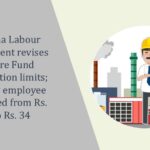Will special allowances paid by an establishment to its employees fall within the expression “basic wages” under Section 2(b)(ii) read with Section 6 of the Employees’ Provident Fund and Miscellaneous Provisions Act, 1952 for computation of deduction towards Employees’ Provident Fund?
The Supreme Court in the recent judgment Regional Provident Fund Commissioner (II) West Bengal and Ors. (“Appellants”) Vs. Vivekananda Vidyamandir and Ors.(“Respondents”) disposed off a series of matters which had a common question whether certain allowances given by employers was liable for contribution in the Employees’ Provident Fund (“Fund”) or not by holding that the allowances in question were essentially a part of the basic wage camouflaged to be part of an allowance so as to avoid deduction and contribution accordingly to the provident fund account of the employees.
This essentially means that the PF contribution will be on the total amount including all the allowances paid to an employee and not just on the basic salary. In the event the amount goes beyond the ‘basic wages’ for the purposes of the Employees’ Provident Fund and Miscellaneous Provisions Act, 1952, the employer has to show that the workman concerned had become eligible to get that extra amount.
In this summary, we will analyse the different facts and circumstance of each matter and look at the reasoning given by the Supreme Court.
Brief Facts:
(i) In Civil Appeal No. 6221 of 2011:
The Brief facts of this Appeal are that the Respondent is an unaided school that gave incentives to the staff and management by way of special allowance. The Authority under the Employees’ Provident Funds and Miscellaneous Provisions Act, 1952 (“EPFO Act”), held that the special allowance came under basic wages and therefore liable for contribution to the fund. In the first appeal the single judge set aside the order of the Authority. In the first appeal by the present Appellant though the division bench had originally allowed the appeal by stating that the allowance fell under dearness allowance and therefore liable for deduction, it later reversed that the judgment stating that the special allowance did not fall under basic wages. Aggrieved, the Appellant approached the present Court.
(ii) In Civil Appeal Nos. 3965-66 of 2013:
The Brief facts of this Appeal are that the appellant was paying to its employees in addition to basic wages, variable dearness allowance, house rent allowance, travel allowance, canteen allowance and lunch incentive. The Authority held that the Act provided for only exclusion of washing allowance. The rest were liable for contribution to the fund. In the first appeal by the High Court partly allowed the writ by stating that only lunch incentive could be excluded but the rest were liable for contribution. Aggrieved, the Appellant approached the present Court.
(iii) In Civil Appeal Nos. 3969-70 of 2013 & Civil Appeal Nos. 3967-68 of 2013:
The Brief facts of both Appeals are that the appellants were not paying the due contribution to the fund by excluding house rent allowance, special allowance, management allowance and conveyance allowance by excluding it from basic wages. The Authority held that the allowances were required to be taken into account as a part of basic wage requiring contribution to the fund. Aggrieved, both the appellants went for appeal and thereafter a review and both were dismissed by the High Court. Thereafter, being further aggrieved, the Appellants approached the present Court.
(iv) Transfer Case (C) No.19 of 2019 (arising out of T.P. (C) No.1273 of 2013):
The Brief facts of this Appeal is such that the Appellant had filed a writ against a show cause notice issued by the Authority calling for records for determining if conveyance allowance, education allowance, food concession, medical allowance, special holidays, nights shift incentives and city compensatory allowance were a part of basic wages or not. The writ was dismissed as being against a show cause notice since the Act provided for a separate remedy in such cases. Against such dismissal, the Appellant preferred an appeal which was transferred to the present Court at the request of the Petitioner for adjudication and final disposal.
Submission by the Parties:
The learned counsel appearing on behalf of the appellant in Civil Appeal No. 6221 of 2011
submitted that the special allowance being given to all staff and teachers at the school was nothing but a disguised dearness allowance. The special allowance that was being paid had all the indices of a dearness allowance and was subject to increment on a time scale. To exclude any incentive wage from basic wage, it should have a direct linkage with the amount of extra output. As the special allowance was being paid to all staff and teachers and since the Act is a social beneficial legislation, the interpretation should be done in a manner to sub-serve and advance the purpose of the legislation. Therefore, the special allowance should be considered a component of contribution for employers under the Act.
The common submission by the counsels appearing for all the other appellants was such that basic wages under Section 2(b) of the Act contains all the necessary exceptions and will not include what would ordinarily not be earned in accordance with the terms of the contract of employment. Whatever is payable in all concerns and is earned by all permanent employees is included for the purpose of contribution under Section 6 and whatever is not payable by all businesses and may not be earned by all employees of a business concern are excluded from the necessary contribution to be made by an employer to the fund. Though certain allowances like dearness allowance and retaining allowance by virtue of being universally applicable came under the purview of contribution under Section 6, other allowances such as house rent allowance, overtime allowance and other discretionary allowances since they were not universally payable by all businesses and therefore would be excluded from the purview of contribution.
Order by the Court:
The Court while passing its order relied upon a series of judgments namely, Bridge and Roof Co. (India) Ltd. vs. Union of India, [(1963) 3 SCR 978], Muir Mills Co. Ltd., Kanpur Vs. Its Workmen, [AIR 1960 SC 985], Manipal Academy of Higher Education vs. Provident Fund Commissioner, [(2008) 5 SCC 428], Kichha Sugar Company Limited through General Manager vs. Tarai Chini Mill Majdoor Union, Uttarakhand, [(2014) 4 SCC 37] and The Daily Partap vs. The Regional Provident Fund Commissioner, Punjab, Haryana, Himachal Pradesh and Union Territory, Chandigarh, [(1998) 8 SCC 90] to arrive at its conclusion. It opined that the counsels appearing for all the establishments have put forward no evidence to prove that the special allowances being paid by them were either variable or were linked to any incentive for production resulting in greater output by an employee and that the allowances in question were not paid across the board to all. The Authority after examining the components of salary in detail arrived at the conclusion that the allowances in question were essentially a part of the basic wage camouflaged as part of an allowance so as to avoid deduction and contribution accordingly to the provident fund account of the employees. Therefore, the court held there was no infirmity in the decision of the Authority and accordingly the passed its judgment. Civil Appeal No. 6221 of 2011 was allowed. Civil Appeal Nos. 396566 of 2013, Civil Appeal Nos. 396768 of 2013, Civil Appeal Nos. 396970 of 2013 and Transfer Case (C) No.19 of 2019 were dismissed.
Source: Supreme Court




